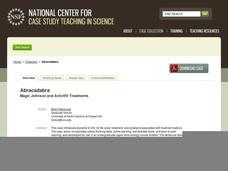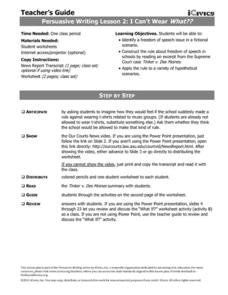Curated OER
What's the Difference Between Procedural and Substantive Due Process?
High schoolers discuss the difference between substantive and procedural due process. They research the uses of due process on the internet and books. They also discuss cases involving students and due process.
Alabama Learning Exchange
Read All About It! Supreme Court Case Makes Headlines!
Students are assigned a landmark Supreme Court case to research. They construct a one-page newsletter on the case which include a summary of the case, two pictures and a short biography on one of the justices on the Court at that time.
Curated OER
Adrenoleukodystrophy (ALD):A Case Study Using the Film
Students study the genetic disorder Adrenoleukodystrophy (ALD) by viewing the film "Lorenzo's Oil". They complete a summary of the movie and answer questions while viewing the movie. Extensions activities also included.
School Improvement in Maryland
Affirmative Action
Do the government's affirmative action policies promote equity in the United States? The Fourteenth Amendment to the US Constitution and affirmative action policies come under scrutiny in an activity that asks class members to...
Curated OER
Brown v. Board of Education
Students examine school segregation and equal protection laws. In this Supreme Court lesson, students examine primary documents from Brown v. Board of Education and discuss the implications of the decision.
Curated OER
Texas v. Johnson
Students examine the freedom of speech. For this Supreme Court lesson, students analyze primary documents from Texas v. Johnson and discuss the implications of the decision regarding flag burning.
National Center for Case Study Teaching in Science
A Case Study of Memory Loss in Mice
Using a short news article, high school or college biologists examine the scientific method in practice. The article, which focuses on an Alzheimer's experiment performed on rats, has very limited information, so learners must be able to...
Curated OER
What's Wong? What's Right?
Explore the ethics, responsibilities, and impacts of the career cluster that relates to law. Learners examine various cases where legal action was taken and resulted in a consequence. They'll act out various scenarios, research jobs in...
Intel
Forensics: Get a Clue
Although the methods are all scientific, forensic science was started by police officers rather than scientists, who relied on observation and common sense. Young detectives use many tools to solve crimes around the school in a...
Curated OER
Courts in the Classroom: Ritter v Stanton
Learners read the case briefs of Ritter v Stanton. They simulate the trial with classmates taking various parts such as appellant, appellee, bailiff, and justices. After conducting a mock argument, they write their own opinion for the case.
Curated OER
Oral Arguments Online
Students conduct a mock oral argument based on the briefs provided and further research as assigned by the instructor. They write an opinion for the case outlining why one legal argument prevailed over the other based on their own...
Annenberg Foundation
Teaching Geography: Workshop 4—North Africa/Southwest Asia
Can Jerusalem be equitably organized? Can Israel and Palestine be successfully partitioned? Part one of a two-part workshop looks at the geo-political history of Jerusalem while Part two investigates Egypt's dependence of the Nile River...
National Center for Case Study Teaching in Science
Bad Blood
When it comes to science and medicine, ethics should always be a primary consideration; unfortunately, that has not always been the case. There are countless examples throughout history of questionable medical practices, marginalized...
National Center for Case Study Teaching in Science
In Sickness and in Health
Based on family history, how likely is it that a couple's children will have a recessive disease? In an in-depth, but easy-to-follow case study, future geneticists learn the story of Greg and Olga, who are hoping to have children, but...
National Center for Case Study Teaching in Science
Abracadabra
How has Magic Johnson managed to stay so healthy, despite being HIV-positive for over 20 years? If you have ever taught about HIV and AIDS, you have most likely been asked such a question. By examining a case study and role-playing as...
iCivics
I Can’t Wear What?
Can schools ban t-shirts picturing musical groups or bands? Your young citizens will find out with this resource, which includes a summary of a United States Supreme Court case from the 1960s about a similar dispute over students wearing...
EngageNY
Understanding Box Plots
Scholars apply the concepts of box plots and dot plots to summarize and describe data distributions. They use the data displays to compare sets of data and determine numerical summaries.
Curated OER
Relationships, Day 5: Acquaintances & Strangers
It is important for special needs high schoolers to know the differences between acquaintances and strangers. They define the world helper, acquaintance, and stranger then discuss a scenario based case study.They talk about touch and no...
Curated OER
STD & AIDS, Day 2: Sexually Transmitted Diseases (STDs)
Keep your secondary special education class informed and aware of STDs, HIV, and AIDS. They learn what STD stands for, how STDs are transmitted, and how to protect themselves. A case study, note to care provider, handouts, transparency,...
Southern Nevada Regional Professional Development Program
Was Bias A Factor? Make an Argument
The ability to analyze an argument is a skill emphasized by the Common Core standards. Offer your class an opportunity to develop and hone their skills by providing them the testimonies in an Oregon court case. After reading the facts of...
ARKive
Animal over Winter
Gosh those polar regions can get cold. So, how do the animals that live there survive the long winters? Learners explore how animals adapted to survive harsh wintry conditions by completing a worksheet and comparing animal survival...
Curated OER
Teaching Social Studies in English
Case studies, an examination of images, and readings of passages from the UN Convention on the Rights of the Child are used to spark conversations in ESL/ELD social studies classes about this highly-charged topic. Using a variety of...
Judicial Learning Center
Judicial Independence
Most people support the idea of an independent judiciary in theory until they hear about a court case that violates their principles. An informative resource explains why the concept is important. It also provides scholars of criminology...
Curated OER
Running Out of Time: Concept Analysis
Tap into the information included in this in-depth analysis of Running Out of Time when planning your unit. The document includes a plot summary, analysis of the literary elements in the novel, implications for various student groups,...

























